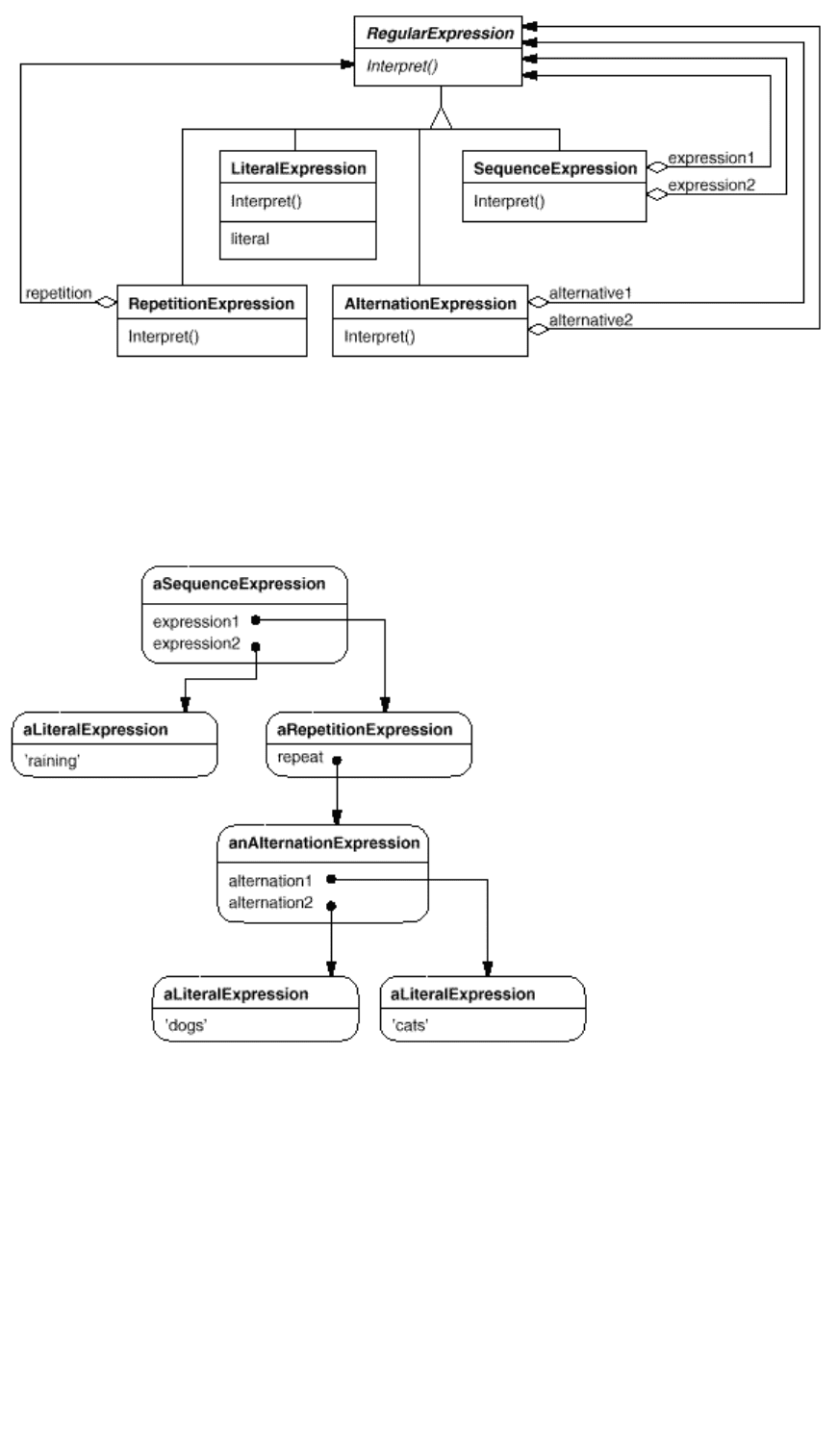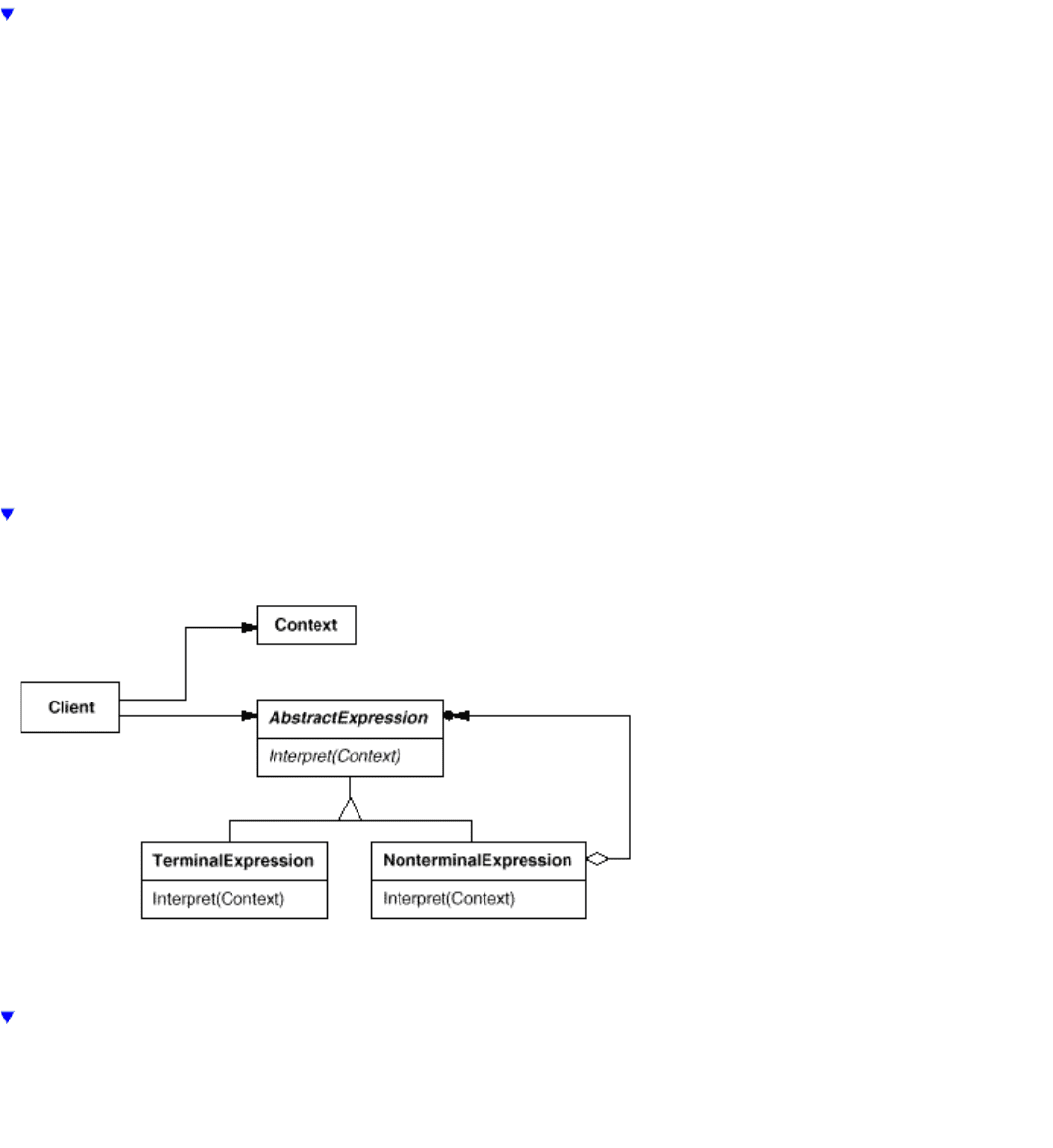Gamma E., Helm E., Johnson R. Design Patterns: Elements of Reusable Object-Oriented Software
Подождите немного. Документ загружается.


Design Patterns
class PasteCommand : public Command {
public:
PasteCommand(Document*);
virtual void Execute();
private:
Document* _document;
};
PasteCommand::PasteCommand (Document* doc) {
_document = doc;
}
void PasteCommand::Execute () {
_document->Paste();
}
For simple commands that aren't undoable and don't require arguments, we can use a class template to
parameterize the command's receiver. We'll define a template subclass SimpleCommand for such commands.
SimpleCommand is parameterized by the Receiver type and maintains a binding between a receiver object and
an action stored as a pointer to a member function.
template <class Receiver>
class SimpleCommand : public Command {
public:
typedef void (Receiver::* Action)();
SimpleCommand(Receiver* r, Action a) :
_receiver(r), _action(a) { }
virtual void Execute();
private:
Action _action;
Receiver* _receiver;
};
The constructor stores the receiver and the action in the corresponding instance variables. Execute simply
applies the action to the receiver.
template <class Receiver>
void SimpleCommand<Receiver>::Execute () {
(_receiver->*_action)();
}
To create a command that calls Action on an instance of class MyClass, a client simply writes
MyClass* receiver = new MyClass;
// ...
Command* aCommand =
new SimpleCommand<MyClass>(receiver, &MyClass::Action);
// ...
aCommand->Execute();
Keep in mind that this solution only works for simple commands. More complex commands that keep track of
not only their receivers but also arguments and/or undo state require a Command subclass.
A MacroCommand manages a sequence of subcommands and provides operations for adding and removing
subcommands. No explicit receiver is required, because the subcommands already define their receiver.
class MacroCommand : public Command {
public:
MacroCommand();
Pag
231
de 358

Gamma – Helm - Johnson – Vlissides
virtual ~MacroCommand();
virtual void Add(Command*);
virtual void Remove(Command*);
virtual void Execute();
private:
List<Command*>* _cmds;
};
The key to the MacroCommand is its Execute member function. This traverses all the subcommands and
performs Execute on each of them.
void MacroCommand::Execute () {
ListIterator<Command*> i(_cmds);
for (i.First(); !i.IsDone(); i.Next()) {
Command* c = i.CurrentItem();
c->Execute();
}
}
Note that should the MacroCommand implement an Unexecute operation, then its subcommands must be
unexecuted in reverse order relative to Execute's implementation.
Finally, MacroCommand must provide operations to manage its subcommands. The MacroCommand is also
responsible for deleting its subcommands.
void MacroCommand::Add (Command* c) {
_cmds->Append(c);
}
void MacroCommand::Remove (Command* c) {
_cmds->Remove(c);
}
Known Uses
Perhaps the first example of the Command pattern appears in a paper by Lieberman [Lie85]. MacApp [App89]
popularized the notion of commands for implementing undoable operations. ET++ [WGM88], InterViews
[LCI+92], and Unidraw [VL90] also define classes that follow the Command pattern. InterViews defines an
Action abstract class that provides command functionality. It also defines an ActionCallback template,
parameterized by action method, that can instantiate command subclasses automatically.
The THINK class library [Sym93b] also uses commands to support undoable actions. Commands in THINK are
called "Tasks." Task objects are passed along a Chain of Responsibility (173) for consumption.
Unidraw's command objects are unique in that they can behave like messages. A Unidraw command may be
sent to another object for interpretation, and the result of the interpration varies with the receiving object.
Moreover, the receiver may delegate the interpretation to another object, typically the receiver's parent in a
larger structure as in a Chain of Responsibility. The receiver of a Unidraw command is thus computed rather
than stored. Unidraw's interpretation mechanism depends on run-time type information.
Página
232
de 358

Design Patterns
Coplien describes how to implement functors, objects that are functions, in C++ [Cop92]. He achieves a degree
of transparency in their use by overloading the function call operator (operator()). The Command pattern is
different; its focus is on maintaining a binding between a receiver and a function (i.e., action), not just
maintaining a function.
Pag
233
de 358

Gamma – Helm - Johnson – Vlissides
Related Patterns
A Composite (126) can be used to implement MacroCommands.A Memento (221) can keep state the
command requires to undo its effect.A command that must be copied before being placed on the history list acts
as a Prototype (91).
Página
234
de 358

Design Patterns
Interpreter
Intent
Given a language, define a represention for its grammar along with an interpreter that uses the representation to
interpret sentences in the language.
Motivation
If a particular kind of problem occurs often enough, then it might be worthwhile to express instances of the
problem as sentences in a simple language. Then you can build an interpreter that solves the problem by
interpreting these sentences.
For example, searching for strings that match a pattern is a common problem. Regular expressions are a
standard language for specifying patterns of strings. Rather than building custom algorithms to match each
pattern against strings, search algorithms could interpret a regular expression that specifies a set of strings to
match.
The Interpreter pattern describes how to define a grammar for simple languages, represent sentences in the
language, and interpret these sentences. In this example, the pattern describes how to define a grammar for
regular expressions, represent a particular regular expression, and how to interpret that regular expression.
Suppose the following grammar defines the regular expressions:
expression ::= literal | alternation | sequence | repetition |
'(' expression ')'
alternation ::= expression '|' expression
sequence ::= expression '&' expression
repetition ::= expression '*'
literal ::= 'a' | 'b' | 'c' | ... { 'a' | 'b' | 'c' | ... }*
The symbol expression is the start symbol, and literal is a terminal symbol defining simple words.
The Interpreter pattern uses a class to represent each grammar rule. Symbols on the right-hand side of the rule
are instance variables of these classes. The grammar above is represented by five classes: an abstract class
RegularExpression and its four subclasses LiteralExpression, AlternationExpression, SequenceExpression, and
RepetitionExpression. The last three classes define variables that hold subexpressions.
Pag
235
de 358

Gamma – Helm - Johnson – Vlissides
Every regular expression defined by this grammar is represented by an abstract syntax tree made up of instances
of these classes. For example, the abstract syntax tree
represents the regular expression
raining & (dogs | cats) *
We can create an interpreter for these regular expressions by defining the Interpret operation on each subclass of
RegularExpression. Interpret takes as an argument the context in which to interpret the expression. The context
contains the input string and information on how much of it has been matched so far. Each subclass of
RegularExpression implements Interpret to match the next part of the input string based on the current context.
For example,
Página
236
de 358

Design Patterns
LiteralExpression will check if the input matches the literal it defines,
AlternationExpression will check if the input matches any of its alternatives,
RepetitionExpression will check if the input has multiple copies of expression it repeats,
and so on.
Applicability
Use the Interpreter pattern when there is a language to interpret, and you can represent statements in the
language as abstract syntax trees. The Interpreter pattern works best when
the grammar is simple. For complex grammars, the class hierarchy for the grammar becomes large and
unmanageable. Tools such as parser generators are a better alternative in such cases. They can interpret
expressions without building abstract syntax trees, which can save space and possibly time.
efficiency is not a critical concern. The most efficient interpreters are usually not implemented by
interpreting parse trees directly but by first translating them into another form. For example, regular
expressions are often transformed into state machines. But even then, the translator can be implemented
by the Interpreter pattern, so the pattern is still applicable.
Structure
Participants
Pag
237
de 358

Gamma – Helm - Johnson – Vlissides
AbstractExpression (RegularExpression)
o declares an abstract Interpret operation that is common to all nodes in the abstract syntax tree.
TerminalExpression (LiteralExpression)
o implements an Interpret operation associated with terminal symbols in the grammar.
o an instance is required for every terminal symbol in a sentence.
NonterminalExpression (AlternationExpression, RepetitionExpression, SequenceExpressions)
o one such class is required for every rule R ::= R
1
R
2
... R
n
in the grammar.
o maintains instance variables of type AbstractExpression for each of the symbols R
1
through R
n
.
o implements an Interpret operation for nonterminal symbols in the grammar. Interpret typically
calls itself recursively on the variables representing R
1
through R
n
.
Context
o contains information that's global to the interpreter.
Client
o builds (or is given) an abstract syntax tree representing a particular sentence in the language that
the grammar defines. The abstract syntax tree is assembled from instances of the
NonterminalExpression and TerminalExpression classes.
o invokes the Interpret operation.
Collaborations
The client builds (or is given) the sentence as an abstract syntax tree of NonterminalExpression and
TerminalExpression instances. Then the client initializes the context and invokes the Interpret operation.
Página
238
de 358

Design Patterns
Each NonterminalExpression node defines Interpret in terms of Interpret on each subexpression. The
Interpret operation of each TerminalExpression defines the base case in the recursion.
The Interpret operations at each node use the context to store and access the state of the interpreter.
Consequences
The Interpreter pattern has the following benefits and liabilities:
1. It's easy to change and extend the grammar. Because the pattern uses classes to represent grammar
rules, you can use inheritance to change or extend the grammar. Existing expressions can be modified
incrementally, and new expressions can be defined as variations on old ones.
2. Implementing the grammar is easy, too. Classes defining nodes in the abstract syntax tree have similar
implementations. These classes are easy to write, and often their generation can be automated with a
compiler or parser generator.
3. Complex grammars are hard to maintain. The Interpreter pattern defines at least one class for every rule
in the grammar (grammar rules defined using BNF may require multiple classes). Hence grammars
containing many rules can be hard to manage and maintain. Other design patterns can be applied to
mitigate the problem (see Implementation). But when the grammar is very complex, other techniques
such as parser or compiler generators are more appropriate.
4. Adding new ways to interpret expressions. The Interpreter pattern makes it easier to evaluate an
expression in a new way. For example, you can support pretty printing or type-checking an expression
by defining a new operation on the expression classes. If you keep creating new ways of interpreting an
expression, then consider using the Visitor (259) pattern to avoid changing the grammar classes.
Implementation
The Interpreter and Composite (126) patterns share many implementation issues. The following issues are
specific to Interpreter:
1. Creating the abstract syntax tree. The Interpreter pattern doesn't explain how to create an abstract
syntax tree. In other words, it doesn't address parsing. The abstract syntax tree can be created by a table-
driven parser, by a hand-crafted (usually recursive descent) parser, or directly by the client.
2. Defining the Interpret operation. You don't have to define the Interpret operation in the expression
classes. If it's common to create a new interpreter, then it's better to use the Visitor (259) pattern to put
Interpret in a separate "visitor" object. For example, a grammar for a programming language will have
Pag
239
de 358

Gamma – Helm - Johnson – Vlissides
many operations on abstract syntax trees, such as as type-checking, optimization, code generation, and
so on. It will be more likely to use a visitor to avoid defining these operations on every grammar class.
3. Sharing terminal symbols with the Flyweight pattern. Grammars whose sentences contain many
occurrences of a terminal symbol might benefit from sharing a single copy of that symbol. Grammars for
computer programs are good examples—each program variable will appear in many places throughout
the code. In the Motivation example, a sentence can have the terminal symbol dog (modeled by the
LiteralExpression class) appearing many times.
Terminal nodes generally don't store information about their position in the abstract syntax tree. Parent
nodes pass them whatever context they need during interpretation. Hence there is a distinction between
shared (intrinsic) state and passed-in (extrinsic) state, and the Flyweight (195) pattern applies.
For example, each instance of LiteralExpression for dog receives a context containing the substring
matched so far. And every such LiteralExpression does the same thing in its Interpret operation—it
checks whether the next part of the input contains a dog—no matter where the instance appears in the
tree.
Sample Code
Here are two examples. The first is a complete example in Smalltalk for checking whether a sequence matches a
regular expression. The second is a C++ program for evaluating Boolean expressions.
The regular expression matcher tests whether a string is in the language defined by the regular expression. The
regular expression is defined by the following grammar:
expression ::= literal | alternation | sequence | repetition |
'(' expression ')'
alternation ::= expression '|' expression
sequence ::= expression '&' expression
repetition ::= expression 'repeat'
literal ::= 'a' | 'b' | 'c' | ... { 'a' | 'b' | 'c' | ... }*
This grammar is a slight modification of the Motivation example. We changed the concrete syntax of regular
expressions a little, because symbol "*" can't be a postfix operation in Smalltalk. So we use repeat instead. For
example, the regular expression
(('dog ' | 'cat ') repeat & 'weather')
matches the input string "dog dog cat weather".
To implement the matcher, we define the five classes described on page 243. The class SequenceExpression
has instance variables expression1 and expression2 for its children in the abstract syntax tree.
AlternationExpression stores its alternatives in the instance variables alternative1 and alternative2,
while RepetitionExpression holds the expression it repeats in its repetition instance variable.
LiteralExpression has a components instance variable that holds a list of objects (probably characters). These
represent the literal string that must match the input sequence.
Página
240
de 358
